Settler leaders have been struggling for years to improve their image in the eyes of those they refer to as the residents of "the state of Tel Aviv." After initiating tours of their blooming communities and areas with splendid views, launching PR campaigns and organizing face-to-face meetings, it seems there is finally hope for a building relationship – yet from an entirely different direction: Getting "high" together.
Related stories:
- Tel Aviv's dark side: Drugs, violence and neglect
- Israeli tablet helps seize int'l crime ring
Drug trafficking IDF officer jailed for 13 years
Following the shortage of "soft drugs" in central Israel, mostly because of the fence built on the border with Egypt, an increasing number of young Israelis are flocking to the territories to consume, buy and roll marijuana with young settlers.
You won't usually hear them discuss politics and the peace process, and words like "the green line" tend to have a completely different meaning during these meetings.
Settling in hearts? Settling in lungs!
It's late in the evening in one of the Samaria communities. A group of young people in their 20s are sitting on the balcony of one of the settlement's houses, getting ready to commit the farthermost illegal activity from the "price tag" hate activities.
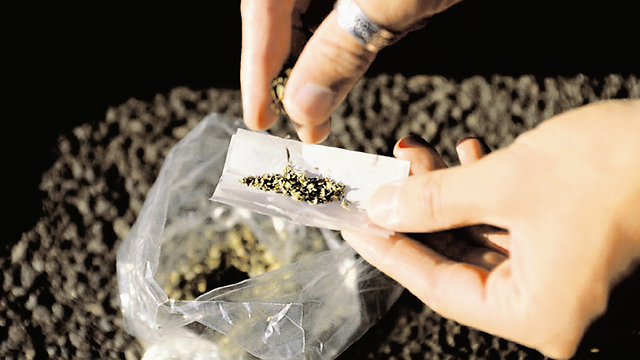
'We joked that after the budgets they also stole our stuff' (Illustration photo: Index Open)
Assaf, a settlement resident, is responsible for supplying the stuff, while his friend Eran, who arrived from the central city of Ramat Gan, is in charge of the rolling. Refreshments to ease the expected drug "munchies" were provided by Yael and Noa, two of Eran's friends from Tel Aviv, who are visiting the territories for the very first time.
"The road is a bit scary, but it's actually pretty nice here. We came to relax, so we shouldn't be afraid," one of them says, refusing to have her picture taken.
Between tokes, Assaf finds the time to share amusing thoughts about marijuana's contribution to the Jewish people's unity. "For years, we settlers have been using the slogan 'Settle in the hearts.' If only we had known that it is much easier to settle in the lungs, everything would have been much easier.
"You see here young people who can speak the same language and bridge ideological gaps. They always bring here all kinds of Tel Avivians to drink the wine and enjoy the view, but they just come and go. The shortage in the center has caused them to come and want to stay, at least for the night, because it's difficult to drive home afterwards."
Eran welcomes the new relationship as well, admitting that he never thought he would return to the territories after his military service, certainly not for this purpose.
"We all know each other from university," he says. "When the shortage began, we started looking for alternative sources and never imagined that Assaf would be the one to provide the stuff.
"One day, while we were making small talk, he told us about a smoking meeting he had with his friends in the community, and we were amazed to discover that while we are craving the stuff – the settlers are celebrating. We joked that after taking our budgets, they've stolen our stuff too."
Coexistence for pot
The reason the settlers have been "blessed" with plenty of drugs has to do with the fact that the police enforcement in the territories is weaker. Growing the stuff is relatively safe and the chance that someone will inform the police is small.
Moreover, while a large number of people compete for the services of every drug dealer and supplier, in Judea and Samaria one source supplies the drugs to a small number of customers by word of mouth.
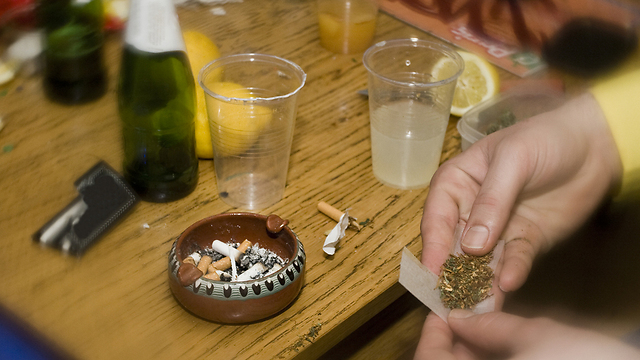
'Young people who can speak the same language and bridge ideological gaps' (Illustration photo: Shutterstock)
"You must understand that here people won't find out after two days about a person who has the stuff," says Assaf. "Take for example those who get medical marijuana and sometimes give some of it to their friends. In Tel Aviv they are harassed and bothered, like someone who has won the lottery. Here such a person is a hidden nature reserve. No one has heard about him or even knows him. He will almost always have stuff to give you."
Assaf is joined by Noa, who says she was "amazed" by how relatively easy it was to obtain drugs beyond the Green Line. "It's not that there are 'ATMs' here like in Lod, but there will almost always be someone who can help you get organized if you look hard enough.
"The funny thing is that we initially thought the suppliers were Palestinians, and then we discovered that there are settlers who smoke and grow the stuff and have simply kept it to themselves."
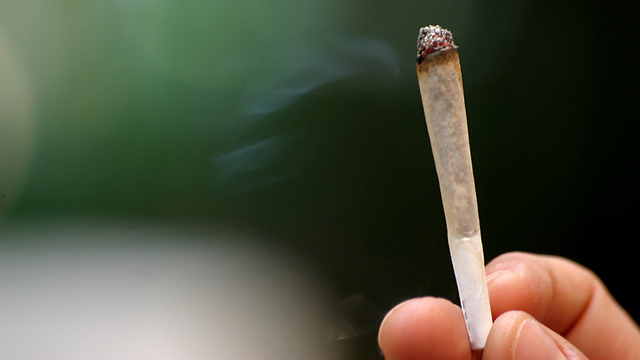
'There will almost always be someone to help you' (Photo: Shutterstock)
Yet there appears to be some rare Jewish-Palestinian fellowship in this particularly charged place for the purpose of getting hold of the desired stuff. A young Palestinian was arrested last week in a police operation in the Judea and Samaria District for operating a drug delivery service from his village near Nablus to quite a few Jewish settlements.
The young man would take orders from settlers in Samaria and the Binyamin region, as well as from communities such as Itamar, Elon Moreh and even Yitzhar, which is considered a particularly sensitive place. He would transfer the drugs to his customers using a taxi which would arrive at the gate of the community or any other agreed upon place.
The police detected the "drug cabs" and questioned the buyers, who framed the young Palestinian and led to his arrest.
"There was no difference between moderate and more extreme communities," says Chief Inspector Nir Sarousi, a detective at the Judea and Samaria District Police.
Out of sight
Police have also detected a recent rise in the consumption and cultivation of drugs in Judea and Samaria. In recent months, Judea and Samaria investigators have uncovered a number of large marijuana production labs, as well as small labs used by residents for private consumption. The police attribute the increase to the shortage across the country as well.
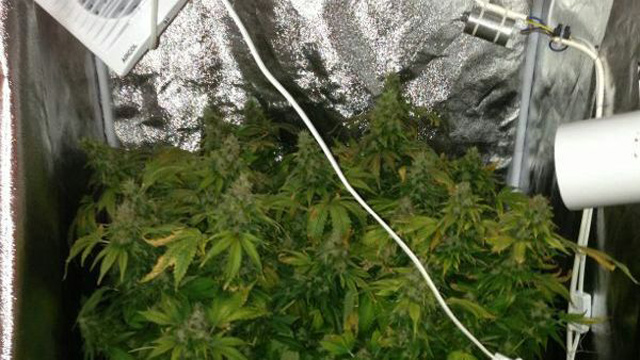
Lab raided in Alfei Menashe (photo courtesy of Judea and Samaria District Police)
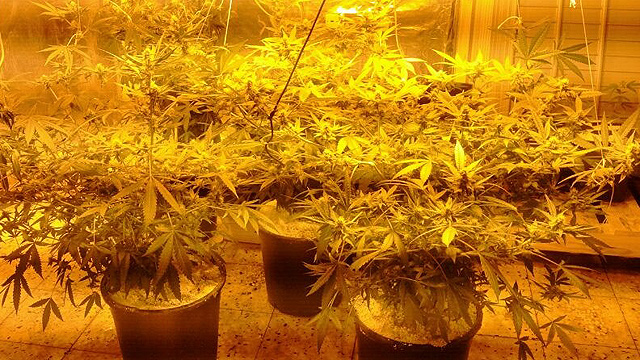
Lab raided in community of Nofim (photo courtesy of Judea and Samaria District Police)
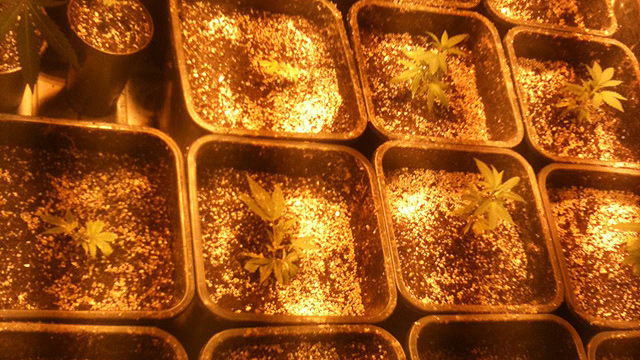
'Focusing on marijuana production' (photo courtesy of Judea and Samaria District Police)
"I have been working in the field of drugs for 10 years now, and the past two years have seen a sharp increase in the number of labs opened or operated in our district," says Chief Inspector Sarousi. "We have encountered large labs as well, but also labs that people use for their own needs. The reason is that the border has been closed and people don't produce hashish here, so they focus on marijuana.
"A person says, 'It's dry out there, perhaps I'll grow some at home, put it in the closet and use it whenever I need it.' People are also investing in the cultivation, buying advanced equipment and irrigation systems. We find modern labs which cost up to tens of thousands of shekels to set up."
Sarousi admits that the phenomenon has to do with the level of enforcement and the wide area where the illegal activity is taking place.
"People have decided to grow it themselves and smoke instead of buying and risking getting caught in our operations. In the territories each person has his own garden and his own yard. It's not like in the city where someone looks out the window and sees the ultra-violet light used for production. Here, whoever puts a little shed in his backyard and maintains a small circle of people who keep it a secret has a very little chance of getting caught. Enforcement here is difficult and they know it."
- Follow Ynetnews on Facebook and Twitter
- Receive Ynetnews updates
directly to your desktop















